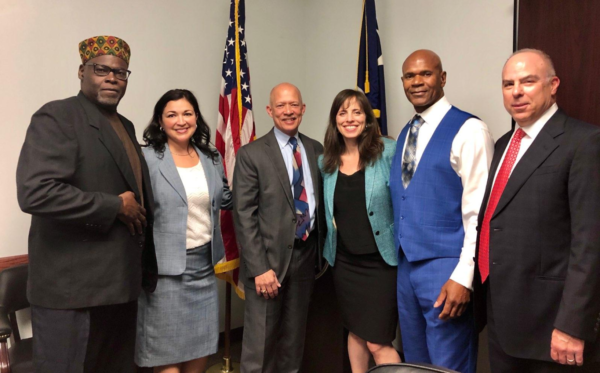‘Doesn’t Seem Like Punishment Enough’: White Former Texas Prosecutor Loses Law License for Withholding Evidence That Could Have Kept Two Black Men from Spending 14 Years In Prison
A former Dallas County prosecutor surrendered his license last month after the Texas State Bar said he withheld evidence that could have cleared two Black men at their capital murder trials in 2000.
Richard E. “Rick” Jackson failed to inform the defense attorneys of Dennis Allen and Stanley Mozee about evidence that could have the prevented the men from ultimately spending 14 years in prison for a crime they didn’t commit.
Allen and Mozee were sentenced to life in prison after being convicted of killing Rev. Jesse Borns Jr., a pastor who died after being stabbed 47 times at his leather and woodworking store in 1999. The pair was released from prison in 2014 and declared innocent in 2019 after DNA evidence cleared them of the crime.
“This case is not about someone disbarred for making a mistake or a prosecutor who accidentally or even sloppily failed to turn over favorable evidence,” Nina Morrison, a lawyer with the Innocence Project told The Dallas Morning News.
“This is someone who repeatedly and intentionally hid favorable evidence from two defendants who were on trial for their lives.”
The Supreme Court of Texas revoked Jackson’s bar card on April 13, saying his “professional misconduct” was “conclusively established for all purposes.” Jackson chose to resign rather than face official discipline.
He is only the fourth lawyer in the country to lose a law license following misconduct that led to a wrongful conviction. The Texas Court of Criminal Appeals previously ruled in 2017 that Jackson withheld evidence that could have benefitted Allen and Mozee.
Jackson’s attorney Bob Hinton told the newspaper that Jackson would have fought to defend the license if he had the money, and that he would be successful in doing so.
“If he had the financial wherewithal and he fought it, we would win it,” Hinton said. “There’s no question in my mind.”
Allen and Mozee, now 57 and 62, were both homeless when they were accused of killing the Dallas pastor. There was no physical evidence linking the pair to the scene of the crime, and the case was built entirely from witness testimony.
On the morning of April 7, 1999, 70-year-old Borns was found stabbed to death in the hallway of his business, J.B. Jezco Enterprise in Dallas.
There were no witnesses to the killing, however people reported seeing two men arguing with Borns the day of the shooting. No suspects had been identified when authorities discovered weeks later that the pastor’s credit cards had been used the day after the murder. Police tracked down the two men seen in the store at the time the card was used using video surveillance, although they were both eliminated as suspects.
By June of that year, Dallas police detective Richard Berry began to focus on Allen and Mozee as potential suspects. Berry questioned Allen, who denied involvement and was released, as well as Mozee, who denied involvement at first, but later signed a confession admitting he and Allen had killed Borns. Mozee suffered from schizophrenia and depression.
Allen and Mozee were tried separately and received life sentences in August and September of 2000.
An investigation by the Innocence Project turned up evidence in prosecutor’s files that would have benefitted Allen and Mozee. Jackson did not disclose the benefits and agreements that were exchanged between the state and at least four informant witnesses — all of whom had pending criminal charges or convictions. In addition, Jackson did not disclose eyewitness evidence that pointed to the men’s innocence. A witness said one of the men who argued with Borns was short while the other was tall. One man also had a distance scar on his neck. Allen and Mozee were about the same height and nether had a distinctive scar.
Allen and Mozee were declared “actually innocent” in 2019 after DNA evidence showed they could not have been the killers. The person who committed the crime has not been caught.
“I knew the truth would come to light,” Mozee told reporters at the time of his release. “I hold no animosity toward anyone.”
Jackson retired from practicing law in 2013. Reaction to the news was as expected. Many saying the punishment was not harsh enough. A CNN reported tweeted, “Disbarment doesn’t seem like punishment enough.” Another noted the rarity of such a move, “A well-deserved–and all too rare–response to life-destroying misconduct.”

